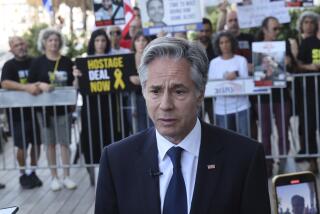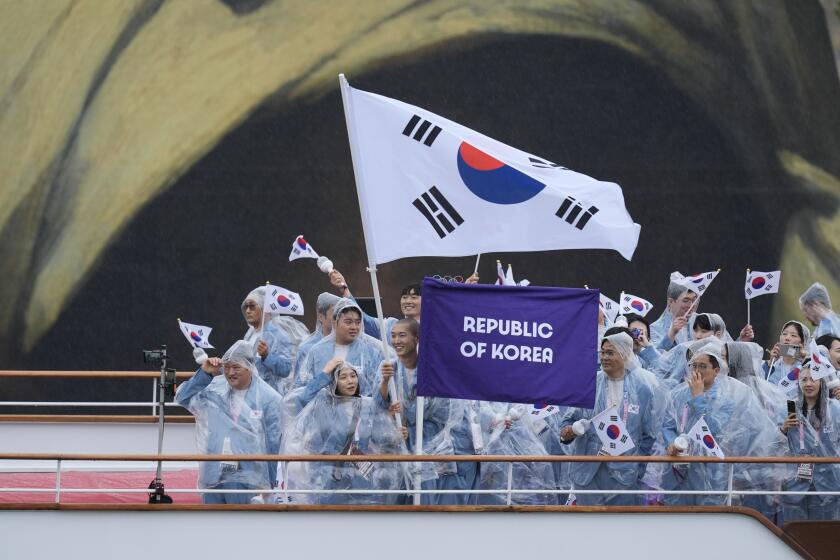Egypt Signals It May Add Its Weight to Arab Calls for a Cease-Fire : Diplomacy: The coalition has dismissed most such efforts. But Cairo’s involvement is stirring interest.
While the United States and its allies continue accelerating their attacks on Iraq, several Arab nations, as well as neutral Iran, have renewed calls for a cease-fire.
Most of these efforts are dismissed by the U.S.-led coalition because they come from pro-Iraqi nations and factions, but this latest call is drawing interest because of signs that Egypt could become involved in the process.
The Egyptian signal, seen by some sources as a trial balloon, came Monday in a column by a journalist close to President Hosni Mubarak writing in the semiofficial Cairo newspaper Al Ahram.
“Egypt could try to get the international community to issue a new warning after four days of hell have passed . . . to get Iraq to start withdrawing without delay, fully and unconditionally from Kuwaiti lands,” wrote the columnist, Ibrahim Nafei.
“Arab troops would replace Iraqi forces and . . . the (U.N.) Security Council would call a temporary cease-fire for a limited period not exceeding a few days to complete this withdrawal.”
Nafei’s column gained added interest because it coincided with trips by Egyptian Foreign Minister Esmat Abdel-Maguid and Information Minister Safwat Sharif to Syria and Libya carrying a message from Mubarak.
“The message deals with the deteriorating situation in the Arab region,” Sharif said, without amplification. Other sources said the mission of the two ministers was to shore up the Arab members of the coalition, indicating that Mubarak is seeking to assure other Arab nations’ continued cooperation by promising he would work for a cease-fire.
“There is a lot of quiet scurrying around among the Arab members of the coalition right now,” said one diplomat. “They all want to be sure that the coalition will hold together.”
Another peace move came Monday when Iranian Foreign Minister Ali Akbar Velayati said he was working with leaders of the so-called Nonaligned Movement and the Organization of the Islamic Conference to end the war.
In a broadcast monitored here, Iran’s official news agency quoted Velayati as saying that the nonaligned effort is being led by Iran, India, Yugoslavia and Algeria. A broadcast by Tanjug, the Yugoslav news agency, said support is being sought from the Soviet Union, Egypt and other unidentified nations.
In addition, Velayati said that 10 positive responses have been received from the 45-member Islamic Conference Organization for a summit meeting on the Gulf War. However, 29 members must agree.
Iran, which fought a brutal eight-year war with Iraq and condemned Hussein’s conquest of Kuwait, increasingly has criticized the scale of the allied attacks, while maintaining that it remains neutral.
“Iran’s neutrality in the Persian Gulf War gives Tehran the opportunity to initiate efforts to bring an end to the destructive war,” said First Deputy Foreign Minister Ali Mohammed Besharati in a statement broadcast Monday.
“We are prepared,” he said, “to cooperate with anyone who is willing to end the war.”
In addition, Jordan’s King Hussein, whose pre-war efforts to mediate the dispute were dismissed, has called again for a cease-fire and more diplomatic initiatives, while Palestine Liberation Organization Chairman Yasser Arafat is in the middle of a trek to Arab capitals seeking backing for a truce.
The PLO said Arafat is asking the United Nations for help and has sent appeals to Cuba, India, Yemen, the Soviet Union, France and Britain.
So far, none of these initiatives has drawn any support from the leaders of the multinational coalition against Iraq. Furthermore, diplomatic sources say that the PLO, which has backed Saddam Hussein in such strong terms that it seems an unlikely mediator, was told that the United Nations will take no action because of opposition from the United States, Britain and the Soviets. The Soviet Union, although supportive of the anti-Iraq effort, does not have troops in the gulf.
Furthermore, even though the peace initiative includes pro-Iraqi forces, Hussein has shown no interest in breaking off the fighting under any conditions that would meet the essential allied demand--that he withdraw from Kuwait.
Still, the effort goes on. Jordanian Deputy Prime Minister Salim Masadah told his country’s Senate that “there are consultations to . . . discuss with members of the U.N. Security Council to reach a resolution on holding fire in this brutal military operation and to work to return to dialogue.”
But Jordan’s call also is seen as hypocritical and self-serving, particularly by the Arab members of the anti-Iraq coalition.
Syria, for instance, accused Jordan of shedding “crocodile tears” over the plight of Iraq. The government-backed newspaper Tishrin wrote Monday that Jordan and others backing Iraq are “posturing . . . about their false concern for Iraq and the Palestinian issue at a time when Iraq is being slaughtered and destroyed as a result of Saddam’s reckless policy.”
However, some Middle East experts say Jordan should not be so quickly dismissed. King Hussein is under tremendous pressure from his population, which overwhelmingly supports Iraq, and must reflect this sentiment if he is to survive.
So, these experts say, the king’s determination to find a cease-fire should be taken seriously.
Actually, there are similar popular pressures within Syria to modify its support for the coalition. A group of 42 Syrian writers, artists and other intellectuals have publicly challenged the government policy.
Freed reported from Nicosia and Ross from Cairo. Times staff writer Mark Fineman in Amman, Jordan, also contributed to this report.
More to Read
Sign up for Essential California
The most important California stories and recommendations in your inbox every morning.
You may occasionally receive promotional content from the Los Angeles Times.






